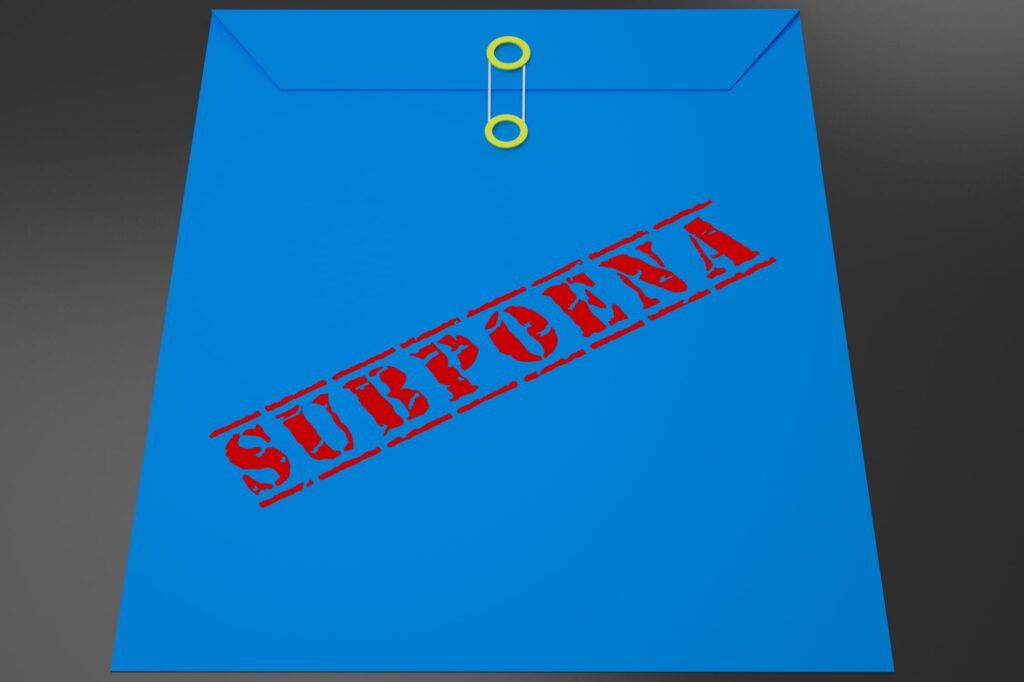A process server is empowered to serve certain documents to defendants and other named parties in legal actions. Understanding the duties and functions of this important position can help you determine if you could outsource certain tasks to a process server.
Process servers are versatile in their professional roles. They can serve a variety of types of papers, as long as their service is protected by state law.
When you understand the kinds of papers that a process server can serve, you can make more informed decisions about how to run your legal operations more smoothly and efficiently.

What kind of papers does a process server serve?
Let’s break down the standard types of legal documents that servers can hand off to individuals who have been named in lawsuits and other legal proceedings. Although this is not a comprehensive list, it gives you a good overview of the variety of papers a process server can serve.
Subpoenas
A subpoena is a formal order, issued by the courts, that requires an individual to appear before the court to testify or produce certain documents. Sometimes, they are issued by other government agencies.
These notices cannot be ignored or disregarded by the recipient, as failure to appear is considered contempt of court. When someone ignores a subpoena, they face legal consequences.
Depending on the circumstances of the case and the rules of the state, subpoenas may be served through the mail or via email. However, process servers often find themselves serving subpoenas, as the courts benefit from the documentation that servers perform as part of their job duties. Recording the service of process provides the courts with evidence that the subpoena was received.

Summons
Like a subpoena, a summons is an official notice to an individual by the court. However, that notice is for a completely different purpose. While a subpoena tells someone to appear in court, a summons notifies them that they have been named as the defendant in a lawsuit.
The courts may issue a summons in multiple scenarios, including:
- Civil cases
- Criminal cases
- Small claims court
In some criminal cases, such as a misdemeanor case, a summons can be used as an alternative to an arrest warrant.
A summons must be issued far enough in advance of the legal case to give the defendant time to prepare for the case.
Complaints
A legal complaint is a written document that outlines the facts of a complainant’s claim. This document kickstarts the lawsuit by detailing the following:
- How the complainant’s rights were violated
- The complainant’s demands of the accused
The complaint, which can vary significantly in length, may be issued at the same time as the summons, but these are two different documents.
Divorce Petitions
Because divorce proceedings can be contentious, many lawyers recommend using a process server to deliver the divorce petitions. This is especially important in cases where a no-contact order has been issued and the two pirates are not allowed to be in each other’s presence.
Child Custody Orders
When custody is disputed, a judge finalizes a child custody order, which determines how guardianship will be divided by the parents. This document provides explicit instructions regarding who has custody of the child, when they have custody, and any rules related to the child’s welfare.
A process server may serve these orders if they are not served in the courtroom. This is especially common when non-custodial parents need to be informed of changes in their parenting plan because they failed to attend the court proceedings.
Prohibited Steps Orders
When the court acts to end a guardian’s custody of a child due to negligence, abuse, or abandonment, a judge will dictate a prohibited steps order. This means that a representative of the court is legally empowered to remove the child from that person’s custody.
Eviction Notices
Landlords and property owners who need to evict a tenant must follow their state’s requirements for eviction. This always includes some form of written eviction notice, which is served by a process server. The eviction notice informs anyone who is occupying the property that they must vacate the premises by a specific date.
Statutory Demands
When a debtor fails to meet certain debt requirements or fails to meet deadlines, their creditors can make statutory demands in the form of a served written document. This proves to the court that the debtor was informed of their obligations and failure to meet them.
Protective Orders and Restraining Orders
Victims of harassment, assault, stalking, and other offenses may be granted a protective and/or restraining order from the person who intends to cause them harm. This is one of the ways that a court can prohibit an alleged abuser from intimidating, harming, contacting, or approaching their victim. A protective order will spell out exactly what kind of contact is and is not allowed.
A restraining order is a broader category that can also apply to relationships like neighbors, coworkers, and other individuals.
For both protective and restraining orders, the victim must file a petition with the court. These orders are usually issued quickly, and a process server must move quickly to inform the named party that they are prohibited from contacting the complainant.

The importance of finding a qualified process server
Legal cases are built on a foundation of accuracy. In fact, you can’t win a case without prioritizing accuracy from day one. That’s one of the reasons why you need to choose a process server who pays meticulous attention to detail and performs service of process with excellence and professionalism.
Firefly Legal works with process servers nationwide, and we only contract with knowledgeable and experienced servers.
A good process server will:
- Serve documents in a way that upholds the due process rights of individuals
- Keep your cases moving forward
- Serve papers quickly
- Perform skip tracing for difficult-to-find defendants
- Always confirm the identity of the individuals they are serving
- Utilize technology to make the process more efficient
- Perform additional legal services as needed, including court filing
Instead of trying to find a process server on your own, partner with us at Firefly Legal. We can connect you with process servers who understand the intricacies of process serving and who prioritize both accuracy and professionalism.
Frequently Asked Questions
Can process servers serve divorce papers?
Yes, process servers can serve divorce papers, including the petition for divorce. This is particularly helpful in cases where spouses are unable to communicate or have no-contact orders in place. Using a process server ensures that the divorce process begins legally and smoothly.
What are child custody orders, and how are they served?
A child custody order outlines how custody is shared between parents and establishes guidelines for guardianship. If a parent is not present during court proceedings, process servers deliver these orders to ensure that all parties understand their legal obligations.
What is an eviction notice, and who serves it?
An eviction notice is a document that informs tenants they must vacate the premises by a specific date due to lease violations or non-payment of rent. Process servers deliver these notices, ensuring that landlords comply with state laws in the eviction process.
Can process servers deliver protective and restraining orders?
Yes, process servers are authorized to deliver protective and restraining orders, often on an expedited basis. These orders are critical in situations involving harassment, abuse, or stalking, and timely service ensures the safety of the victim by formally notifying the named party of the restrictions.
Contact Firefly Legal today to learn more about how you can tap into our nationwide network of process servers! No matter your needs, Firefly Legal can handle it!





